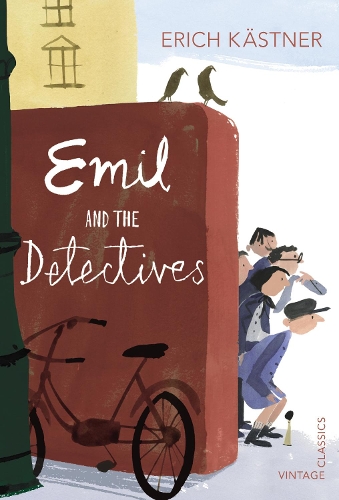
Emil and the Detectives
(Paperback)
Available Formats
Paperback
Published: 4th May 2001
Paperback
Published: 1st August 2012
Paperback
Published: 21st October 2015
Publishing Details
Emil and the Detectives
By (Author) Erich Kstner
Vintage Publishing
Vintage Children's Classics
1st August 2012
2nd August 2012
United Kingdom
Classifications
Children
Fiction
Childrens / Teenage fiction: Crime and mystery fiction
833.912
Physical Properties
Paperback
176
Width 129mm, Height 189mm, Spine 11mm
122g
Description
Join Emil's gang - a team of detective children, in this captivating mini-masterpiece of children's writing 'Password Emil!' Emil is excited to be taking the train on his own for the first time. He doesn't like the look of his fellow passenger, the man in the bowler hat. Emil will just have to keep his wits about him and his money in his pocket. But Emil falls asleep and when he wakes up the man in the bowler hat is gone - and so is the money! Emil is determined to get it back. He teams up with a gang of young detectives and so begins a hair-raising chase across Berlin to catch the dirty rotten thief... BACKSTORY- Learn all about the book's brave author and find out just how good a sleuth you would be.
Reviews
"This is a well-presented edition of a real classic, and I hope it helps it find the new audience it deserves" The Bookbag "Both boys - me in 1955, my son in 1996 - seemed to be drawn into this story in some way beyond the usual...The main pleasure of the book is in the way in which it plays to the fantasy of omnipotence in a child: that a team of kids could really organise themselves into a team of detectives and catch a thief" -- Michael Rosen Guardian "A great political story: democracy in action" -- Philip Pullman Ten books every Year 7 child should read "The perfect introduction to the world of fictional crime detection" Independent "Emil is a wonder... the book had, and still has, the effect of making me feel part of Emil's little gang of boys... Emil and the Detectives is a little masterpiece... Read it and you will be happy" -- Maurice Sendak
Author Bio
Erich Kastner was born in Dresden in 1899, the son of a saddle maker and a maidservant. He was drafted into the army in 1917, and his experiences there were to influence his later pacifism. He published Emil and the Detectives in 1928 to great success. A sequel, Emil and the Three Twins, appeared in 1933, but soon afterwards his books were labelled "contrary to the German spirit" and burned in public by the Nazis. He was interviewed by the Gestapo several times, but remained in Berlin until 1945, when he fled the city to avoid the Soviet assault. After the war he continued to write and remained committed to anti-war movements until his death in 1974.
